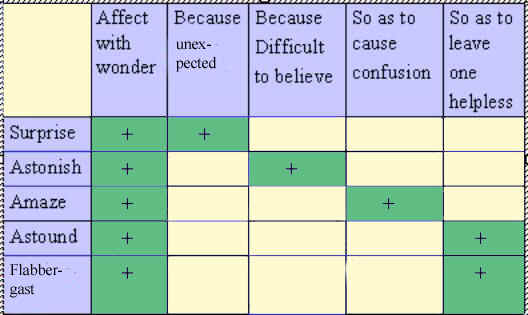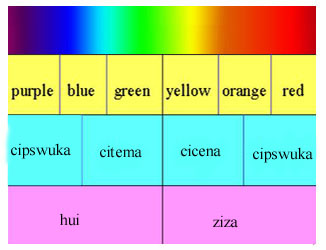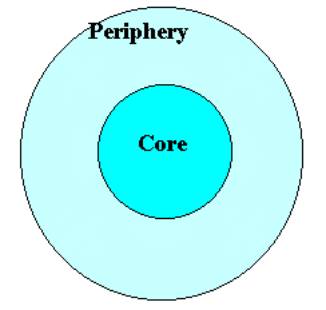EL1102: Studying English
in Context
Week No. 2: Variation in Lexis
Organisation
I.
Different types of lexical variation
II. Core
and Periphery words
III. Two
parameters: choices and combinations
IV. Two
principles: Appropriateness and Precision of meaning
V. How
these principles are applied in language use
1.
Temporal Variation
hurry v. hasten
listen v. hark
buy v. purchase
look v. observe, behold
movies v. pictures
pharmacist v. apothecary
Temporal Variation: Examples
2 different translations (1925 / 1983) of Pinnochio (1880)
1.a) Hasten Pinnochio.
1.b) Hurry Pinnochio.
2.a) Without adding another word the marionette bade the good Fairy
goodbye.
2.b) Without adding another word the puppet said goodbye to the good
Fairy.
From the Bible:
3.a) The wicked flee when no man pursueth.
3.b) The wicked run when no one is chasing them.
2. Regional / Geographical variation
automobile [car], gas / gasoline [petrol], 1st floor [ground floor], sidewalk
[pavement] (AmE)
billabong [river/stream], jumbuck [sheep] swagman [a tramp] (AusE)
loch [lake], bonnie [beautiful] (Scottish Eng.)
zap [photocopy], handphone [mobile phone], steamboat [type of meal], vomit
blood , (SE)
tiffin [snacks], bandh [a strike], raga, yoga [IndE]
3 Social / Contextual Variation
woman v. lady (formal)
horse v. steed / stallion (formal)
cobweb v. gossamer (poetic)
colour v. hue (poetic)
stomach v. abdomen (technical)
burn, set fire v. arson (technical)
a small bit v. teeny weeny, teensy (informal)
glamorous v. glitzy (informal)
Social / Contextual Variation: Examples (poetic)
1.The stranger lighted from his steed,
And ere he spake a word,
He seiz’d my lady’s lily hand, And kiss’d it all unheard.
(John
Keats’s ‘Song’)
2. A
noiseless patient spider . . . . . . . . . . . .
It launched forth filament, filament, filament out of itself,
Ever unreeling them, ever tirelessly speeding them.
And you O my soul where you stand,
Carelessly musing, venturing, throwing, seeking the spheres
to connect them, . . . . . . . . .
Till the gossamer thread you fling catch somewhere, O my soul.
(Walt Whitman, ‘A Noiseless Patient Spider’)
Social /
Contextual Variation: Examples (Informal)
3. It was an itsy bitsy, teeny weeny, yellow polka dot bikini
That she wore for the first time today.
It was an itsy bitsy teeny weeny yellow polka dot bikini,
So in the water she wanted to stay.
(from a 60’s pop song by Brian Hyland)
4. The
glitzy, smaltzy Barbie (doll) has become passé and it’s now time for Sindy to
take over. . . (The Straits Times, 29/7/99)29/7/99)
Borrowings from other languages
1. request [ask], courage / gallantry [guts] deceive [cheat], protect [shield]
(French)
2. exit [way out], zenith [highest point], scintillate [sparkle] (Latin)
Note also: feline, canine, equine and porcine
3. centre [middle], dialogue [speech], panic [fear], lexis / lexicon [words]
(Greek)
Therefore the unprecedented number of synonyms that exist in English
1.ask, pray, beg, crave, request, beseech, implore, entreat, solicit,
supplicate, petition, importune, etc.
2.join, unite, link, connect, combine, unify, associate, amalgamate, integrate,
incorporate, etc.
3. mad, potty, loony, crazy, daft, barmy, bonkers, batty, bananas, neurotic,
psychotic, demented, schizophrenic, etc.
4. a scold, a shrew, a vixen, a virago, a termagant.
Core and Peripheral Words
Core words
Good, bad, right, wrong, man, wife, father, mother, eat, drink, home, wit,
fight, love, live, work, sweet, bitter, rough, duty,
Peripheral words
aggrandise, apartheid, ameliorate, centrifugal, genocide, genuflect,
Episcopal, masochist, misanthrope nocturnal, nomenclature, opulent,
ostentatious, prurient, paraphernalia, pseudo-axial, rambunctious,
triploblastic
Words-in-between
artistic, behaviour, contribute, encourage, exquisite, familiar, fantastic,
habitual, marvellous, memorable, obsolete, particular, profound, reasonable,
satisfaction, vibrant, specialised, tolerate, tradition, villainy, . . .
-- not all alike / a range, a continuum
We spent a
long time deciding on a title for this book. We wanted to find a word that made
it clear that this brand new book of tantalising crosswords from the Daily
Telegraph was the largest and most enjoyable ever and was crammed full of
puzzles.
We tried the Amplitudinous Book of Crossword Puzzles, but that didn’t
sound right. So then we tried monumental, towering, elephantine, thumping,
Brobdignagian, Cyclopean, megalithic. But none of them produced quite the right
effect. There’s really only one word that works – and so we settled on the
Daily Telegraph BIG Book of Crosswords.
– Daily Telegraph Big Book of Crosswords (London: The Daily
Telegraph, 1983)
Euphemisms
and mystification
war
v. armed aggression / intervention
war zones v. operational areas
battles v. military
operations/engagements
bombs v. explosive device
nuclear missiles
v. strategic weapons
soldiers
v. military advisers/ reservists,
parliamentary units
industrial
action = strikes
recession = depression
liquidation = murder
incident = any unpleasant occurrence
Core words: nursery rhymes, idiomatic phrases
and proverbs
1.
Twinkle, twinkle, little star . . .
2. Don’t cry over spilt milk.
3. Birds of a feather flock together.
4. Where there is smoke there will be fire.
Quite
inappropriate in such contexts:
1. Twinkle, twinkle little star . . .
Scintillate, Scintillate, asteroid minim.
2. Don’t cry over spilt milk.
It is fruitless to become lachrymose of precipitately
departed lactile fluid.
3. Birds of a feather flock together.
Members of an avian species of identical plumage tend
to congregate.
4. Where there is smoke there will be fire.
Where there are visible vapours that have their
provenance in ignited carbonaceous material, there is conflagration
Recognising the rich resources of the vocabulary
Use of words: Choices and combinations
(a) appropriateness
(b) precision of meaning, construction of views of situations, etc.
PRAXIS: Acting in and on our world, seeing and projecting the world and experience
differently
Appropriateness
For example, compare
1. (a) I tell you I’m speaking the truth. (b) I affirm the veracity of my
statement.
2. (a) Under no circumstances, can the stupidity of this act be condoned.
(b) Say what you like, I won’t take this bullshit
3. (a) Climbing up that mountaintop was a hell of a difficult thing
to do!
(b) The ascent to the peak was an overwhelmingly arduous task.
4. (a) The tempting smells of baking made me even more hungry.
(b) The delectable aroma of baking caused my gastronomic juices to flow
all the more profusely.
Two parameters: Choices
geology v. earthlore
solar v. sunny
nocturnal v. at night
commence v. begin
cardiac organ v. heart
foreign aid v. outside help
1. Appropriateness – one of the considerations in
choosing between core and peripheral words: different topics, subjects, genres,
effects, functions, aims, doings call for different choices for effectiveness
in communication. Therefore, each is important for its own purposes.
Appropriateness: Some examples
1. The genre of advertisements
A choice and unique blend -- as fine a promise of pleasure to come as you’ll
ever find. ESCUDO – a marvellous tobacco blended from just two kinds of leaf.
Gold Virginia (actually grown in Virginia USA) and dark perique from Louisiana.
Cool smoking discs of pure tobacco.
2. The language of laws and statutes
Whoever, after the commission of a felony, harbours conceals, maintains or
assists the principal felon or accessory before the fact, or gives such
offender any other aid, knowing that he has committed a felony or has been
accessory thereto before the fact, with intent that he shall avoid or escape
detention, arrest, trial or punishment, shall be an accessory after the fact,
and except as otherwise provided, be punished by imprisonment in the state
prison for more than seven years or in jail for not more than two and one half
years or by fine of not more than one thousand dollars.
3. Mother-child interaction
M: Oh you’re a goose.
C: Do goosies do that ?
M: No no … but you often call people a goose if they’re silly.
C: Mmm
M: You know if you eat too much I say you’re a little pig. I say you’re a
little piggy-wig.
C: Yeah
M: Well if people are silly, you say ‘silly goose’
4. The genre of poetry
I know you:
You are as light as dreams,
Tough as oak,
Precious as gold,
As poppies and corn,
Or an old cloak:
Sweet as our birds
To the ear,
As the burnet rose
In the heat
Of Midsummer.
(Edward Thomas, ‘Words’)
A well-known verse from the Ecclesiastes - use
of Core words
I returned and saw under the sun, that the race is not to the swift, nor the
battle to the strong, neither yet bread to the wise, nor yet riches to the men
of understanding, nor yet favour to men of skill; but time and chance happeneth
to them all.
A modernised version – displays use of more peripheral words
Objective consideration of contemporary phenomena compels the conclusion
that success or failure in competitive activities exhibits no tendency to be
commensurate with innate capacity, but that a considerable element of the
unpredictable must invariably be taken into account.
2. Precision of Meaning
‘What’s in a name? A rose by any other name would smell as sweet.’
(Shakespeare, Romeo and Juliet) But would it?
How about ‘stinkweed’? Advertisers, journalists and politicians display great
awareness of precision
Name for a high powered new car:
Vista Cruiser
Phoenix
Grand Prix
But - Lumbering Jack?
Precision of meaning: Some examples
1. He likes to be known as a _____ person.
thrifty
parsimonious
tight
ungenerous
mean
stingy
Q: How does this work?
Ans: Through the choices made
Precision: exactitude of meaning through relations IN ABSENTIA - i.e.,
relationships which the items chosen have with other items which could have
been chosen at this point instead, but which were not, so that they are
absent.
Relationships IN ABSENTIA

Names of
the colours in three languages: ENGLISH SHONA BASA

Imagine that English has only three colours: red, white and blue.
How would you describe the different objects on the screen?
This item is _____.
i.e., red = not blue, not white
blue = not red, not white
Now add green to this list and repeat the exercise. What does red, blue now
mean?
(A) Appropriateness
1. (a) The party began.
(b) The convocation commenced.
2. (a) He’s a shameless liar
(b) He’s a slanderous rogue / knave.
3. (a) He went to the races quite often.
(b) He regularly frequented the equestrian
events.
4. (a) Suddenly, the undertaker took out his false teeth.
(b) Without warning, the mortician
removed his dentures.
2. Combinations
Words also work through relationships IN PRAESENTIA, i.e., in terms of their
relationship with other words selected alongside the one chosen and combined
with it, so these other words are actually present.
(B) Precision of meaning
Buxom / lissome / pretty; macho / muscular
a _______ man
a _______ woman
Which goes where?
What happens to the meanings of the words when they combine differently?
Another example
fat / stout / plump / obese
a ________ man
a ________ woman
a ________ baby
a ________ book
a ________ salary
a ________ wad of notes
Compare the two different descriptions of ‘Man’ below:
Man is a metazoan, triploblastic, chordate, vertebrate, pentadactyle,
mammalian, eutherian, primate. The main outlines of each of his principal
systems of organs may be traced back like those of the other mammals, to the
fishes.
What a piece of work is man! How noble in reason! How infinite in faculties! In
form and moving, how express and admirable! In action, how like an angel! In
apprehension, how like a God! the beauty of the world! the paragon of animals.
(Shakespeare, Hamlet)
© 2000 Rani Rubdy
